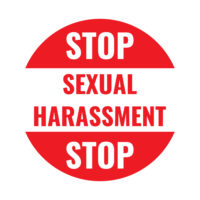SPEAKING UP ABOUT SEXUAL MISCONDUCT

“Inaction is an action. Silence is indifference. Justice requires action and a voice.”
Those are the words uttered by Judge Rosemarie Aquilina just weeks ago, right before sentencing sports doctor Larry Nassar to 40-175 years in prison for the sexual abuse of female Olympic athletes.
Prosecutor Angela Povilaitis spoke to the victims of Nassar’s sexual abuse: “To each survivor: thank you. Thank you for coming forward, for trusting us, for doing what is so hard and difficult… “What is obvious is that a strong group of determined women can in fact change the world — and will,”Povilaitis added.
Ironically, immediately following the culmination of the Nassar sexual abuse trial, CNN published the results of an investigation of sexual abuse by federal judges. CNN researchers compiled and reviewed nearly 5,000 judicial orders relating to misconduct complaints. Very few cases against judges are deeply investigated, CNN legal analyst Joan Biskupic points out; very few are disciplined in any way. Chief Justice John Roberts wrote that “Events in recent months have illuminated the depth of the problem of sexual harassment in the workplace, and events in the past few weeks have made clear that the judicial branch is not immune.”
A University of Denver law professor highlighted one key aspect of the problem that allowed abuse to continue in both the Olympic sports arena and in the judicial system: Often people avoid taking action against a colleague, knowing that they will be continuing to work together in the future. For this reason, Hawaiian Senator Mazie Hirono, CNN notes, has begun asking judicial nominees whether they ever made unwanted requests for sexual favors or committed verbal or physical harassment, or whether they had ever faced discipline or entered into a settlement related to such conduct.
There is one federal lawsuit happening right now, in which a female clinician in the drug court program is accusing Massachusetts Federal Trial Judge Thomas Estes of forcing her to perform sex acts in his chambers. The judge has been placed on administrative assignment and has not been allowed to hear cases pending the outcome of the case. “I would hope that if anyone else has been victimized by him, they will come forward and provide information, former Judge Mary Hurley stated.
Court of Appeals Judge Theodore McKee summed up the problem nicely: “It’s very difficult for someone from outside to know what’s happening, and it’s not always easy for insiders to know what was happening.”
As a husband-wife team at Ramey & Hailey Law, we want to reach out to folks who know they need to speak out, who need to talk about what happened to them or to someone they love. They need to know that victims may be entitled to financial compensation, which can help them rebuild their lives. They need to know that at Ramey & Hailey, they can find someone to listen to them without judgment, someone whom they can trust. Most important, until and unless victims speak out, often nothing happens to prevent the crime from happening over and over again.
Larry Nassar was an adult who betrayed the trust of the young, vulnerable athletes who looked to him for help and therapy. Federal judges in many cases exploited the trust of young women looking to them as mentors. In that same manner, we’ve found over the years, sexual molestation often comes about not at the hands of a stranger, but at the hands of an adult in a position of trust in a child’s or young person’s life – a minister, a teacher, a mentor, a coach or advisor, even a relative.
Justice requires action and a voice. At Ramey & Hailey Law, we ask, will your voice join in to help prevent others from becoming victims of sexual abuse?




